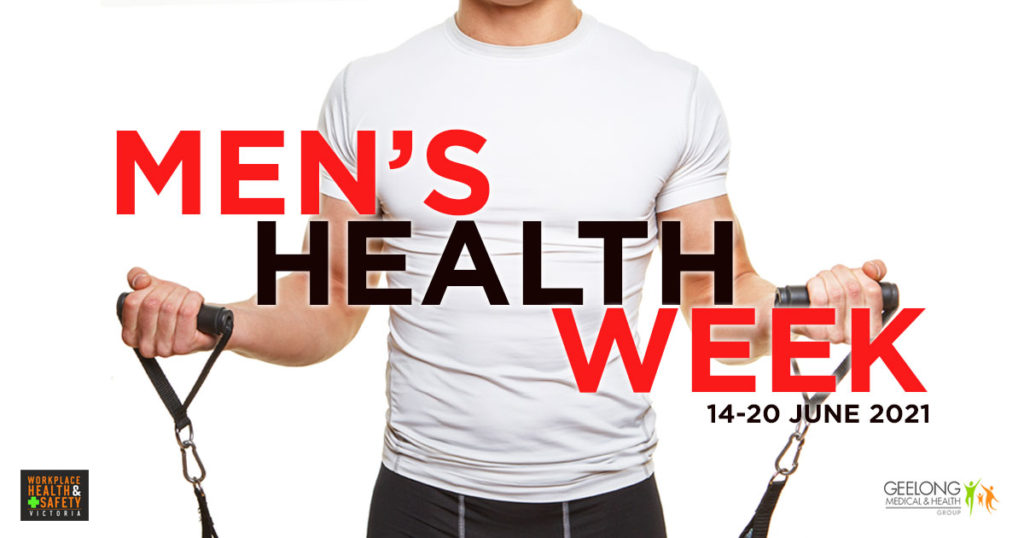Men’s Health Week (14-20 June 2021)
June 14 2021
The men’s health week is a week to celebrate men and talk more about their health. You may wonder why men’s health is so important. The answer is simple – the male population health status is relatively poorer than that of females in Australia. This is not an Australian phenomenon as much as it is a global phenomenon. The life expectancy of men in Australia is lower and more male die at every stage of life. They are also more likely to have accidents, commit suicides, and suffer health conditions linked to lifestyle than females within their age group.
Despite this higher vulnerability to health conditions, males are also less likely to visit and use health services which have led to the perception or stereotype that they do not care about their health as well as the fact that health care services are not equipped to effectively interact with men.
But Men’s Health Week goes beyond this. The week started in 1994 in the United States and was created by the US Congress to increase awareness about preventable health problems and also promote early detection, treatment and management of diseases among boys and men. In Australia, localised and small Men’s Health Week events started in Victoria around 2000, and it later spread to New South Wales.
The second world congress of men’s health was held in 2002 in Vienna, Austria. This even brought six men’s health organisations together, and it was here that the decision was made to organise international events every June, right before Father’s Day in the United Kingdom and the United States.
The Vienna Men’s Health Declaration
The Vienna congress set to establish;
- Promotion of awareness of men’s approach to health
- Recognition of men’s health as a critical issue, and there are health issues that are peculiar to men.
- Changing the health care approach so it can be more sensitive to men’s needs
- Connecting social and health policies to achieve men’s health goals
- Creating community and school programs targeting young men and boys
Understanding men’s health in numbers
Discover things you didn’t know about men’s health and all the factors that affect men’s health in the long run. This includes identifying the gender gap in terms of health and how male behaviour affects their health, among many others.
The Gender Health Gap
There is a vast gulf when it comes to gender health such that even in Australia, which is one of the world’s healthiest countries, on average, men die six years younger than women. The male population of Australia also accounts for;
- 2 of every 3 violent deaths
- 3 of every 4 road deaths
- 3 of every 4 suicides
- 4 of every 5 deaths due to heart disease before 65
- 95% of deaths in the workplace
It should be pointed out that women do better and worse than men in different aspects of health. There is a gap that usually starts from conception and goes on throughout a lifetime in terms of life expectancy.
- The likelihood of boys being stillborn or miscarried is higher.
- Boys account for 3 of every 4 sudden infant deaths.
- Boys account for 3 of every 5 children that die before reaching 15
- Male account for 70% of people who die between 15-24
- More than 60% of those who die before 65 are male
- The likelihood of men under 75 dying from preventable causes is twice that of women.
- The likelihood of women living to be 100 and older is thrice as higher.
Is Male Behaviour putting their lives at risk
It is usually said that men are their worst enemies when it comes to their healthcare. Facts show that men experience;
- 56 per cent of disease because of lack of exercise
- 60 per cent of disease connected to smoking
- 60 per cent of disease linked to body mass
- 71 per cent of disease linked to alcohol
- 72 per cent of disease connected to environmental factors such as workplace hazards
There is also another claim as to men’s reluctance to talk or seek help about their mental and physical health. Even though men have lesser access to support services than women, we must not use gender stereotypes to explain men’s health issues. Evidence shows that men in the working-age use fewer Medicare services when compared with women, but for those over 65, the number is similar and men over the age of 75 use more. Experience has shown that support services offered in a male-friendly way, more men seek help. It will also take more than changing men’s individual health behaviour to make a difference because those behaviours account for merely 30% of poor health.
Men’s Social Status and effects on their health
The lower life expectancy of men is not just a result of unhealthy behaviours but other factors that determine social status such as;
- Childhood experiences
- Level of education
- Fatherhood experiences
- Working lives
- Living conditions
- Social connections
- Access to male-friendly services
The Men’s Health Week in Australia serves as a platform for debating and challenging men’s health issues so as to raise awareness about men’s health profiles, their health needs, and the outcome. The approach focuses on celebrating the strengths of men, their contributions, and the roles they play. This week is all a week of engagement and celebration of men without losing focus of the health issues.
The week is an opportunity for you to make a positive difference in the lives of the male population, and it includes different programs and events in different localities and communities. In light of the pandemic, most events this year are hosting online, and people can connect from anywhere in Australia.
—
Article from Working With Men
For more information about Men’s Health Week, visit https://www.menshealthweek.org.au/about/about-the-week
